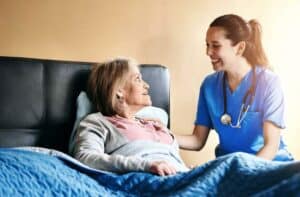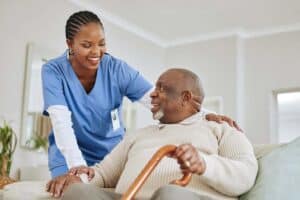Skin is the biggest organ in the human body. It is also one of the first things that others notice about us. That’s why there is a multibillion-dollar industry dedicated to developing more effective and better-looking products for skincare.
Together with creating first impressions, our skin is our best friend. It helps us feel the world around us, shelters us from the environment, and also serves as a temperature regulation device for our bodies.
The condition of our skin is one of the first tell-tale signs of aging. Many factors can affect the way our skin looks. Some of these are the hormonal balance in the body, our diet and water intake, the lifestyle we have, medical conditions we may suffer from, and of course our genes.
Our caregivers at Amy’s Eden are well aware of the challenges this stage of life presents and they are prepared to look after your aging loved one in the best possible way.
Typical Changes In Seniors’ Skin
As your loved one ages, their skin undergoes various changes that make it more vulnerable to damage. Some of these changes to their skin are likely to occur.
- Changes in color – With age, skin thins out and loses some of its natural pigmentations. As a result older skin becomes paler, and even translucent sometimes. In addition, darker spots, called ‘liver spots’ caused by exposure to sunlight, appear typically on the face, hands, and legs.
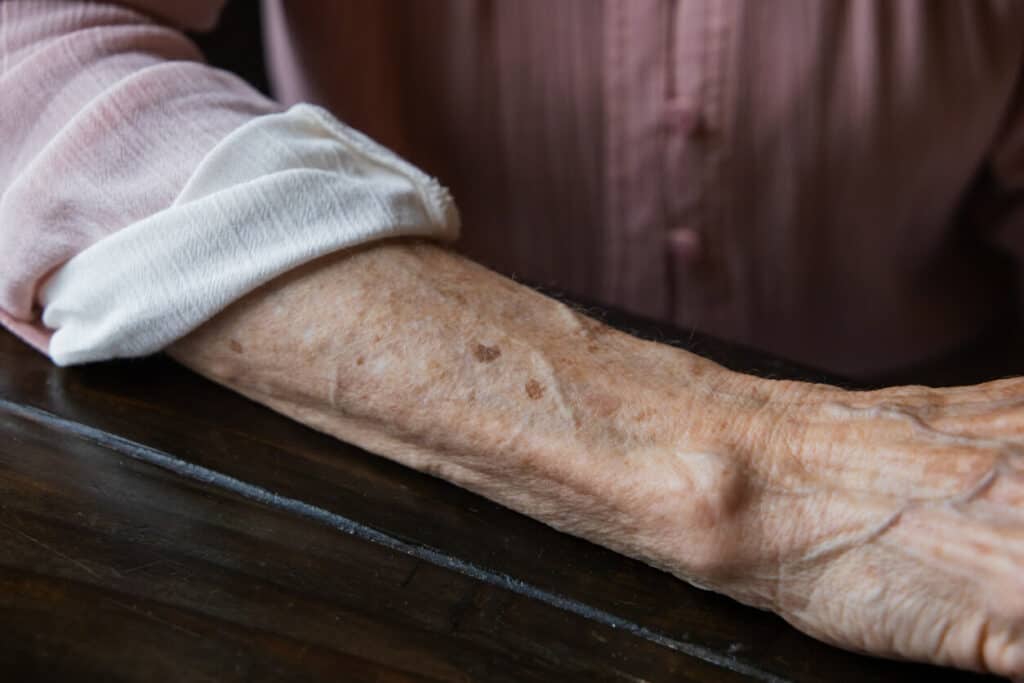
- Changes in texture – In the layers of the skin there are glands that produce sebum, the natural oil our bodies create. As we transition into senior age the secretion of the oil declines and as a result, our skin loses smoothness, becomes dryer and itchy, and wrinkles start showing.
- Changes in elasticity – Together with the lowered production of sebum, the skin’s production of collagen also decreases, and the underskin fat recedes. This causes the skin to lose elasticity, sag, and appear more brittle and battered looking.
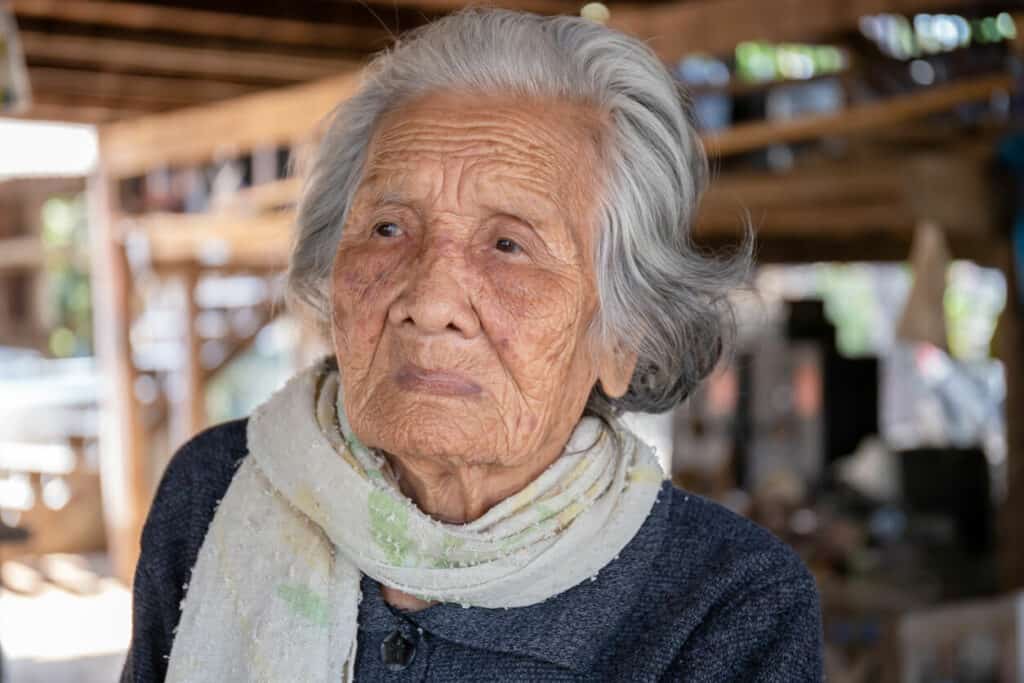
- Changes in the blood supply – Another change that happens with age is that the blood vessels in the skin become easily damaged. Sometimes just a simple rubbing of the skin can cause the small blood vessels to burst. Bruises or blood collections in the skin sometimes called senile purpura occur as a result of this.
- Changes in temperature – The sweat glands which are also located in the layers of the skin become less active. Consequently, the risks of hypothermia or overheating significantly increase.
- Changes on the surface – Seniors’ skin is prone to developing growths, skin tags, moles, warts, and other blemishes. Most often, these are benign but they need to be observed as the chances of getting skin cancer also rise with age.
Factors Contributing To The Aging Of The Skin
Although these transformations in the skin of your beloved senior are normal, how early in life they start to happen can depend on a number of factors. Here are the most important of them.
- Sun exposure. The UV light coming from the sun is by far the most damaging factor to human skin, all dermatologists agree. That’s why applying sunscreen lotions even in winter has become the first and most important preventative measure in skincare today. Moreover, UV light not only ages our skin faster, causing dark spots and dryness but is also the number one culprit for skin cancer.
- Hydration. The amount of water one has to drink daily has long been the subject of debate. Skincare experts agree that proper hydration begins by hydrating the body internally. Therefore we need to drink at least 1.5 to 2 liters of water daily. Please note that your aging beloved needs even more water as they are even more prone to dehydration due to a diminished feeling of thirst.
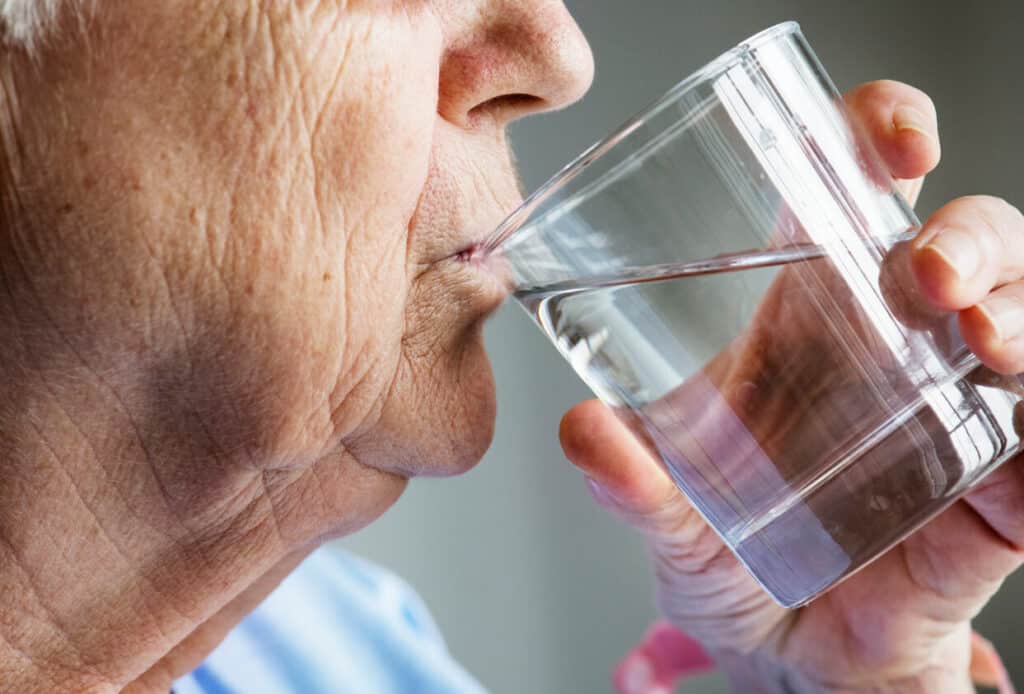
- Diet. A healthy diet, rich in nutrients and vitamins and void of processed food, with less consumption of salt and sugar, is beneficial for the whole body as well as the skin. To further support the aging skin, one can consume collagen-rich foods, as well as products containing vitamins A and E, and essential fatty acids.
- Hormonal balance. Hormones in the body play an essential role in the aging process. Estrogen, progesterone, and testosterone are some hormones that can affect the appearance of the skin. The decrease in estrogen leads to dry skin, while low progesterone levels which are closely related to estrogen levels, can result in thinner and saggier-looking skin. Testosterone is responsible for collagen deposits and lack of it can cause a loss of elasticity. Additionally, thyroid hormones can affect the overall appearance of the skin.
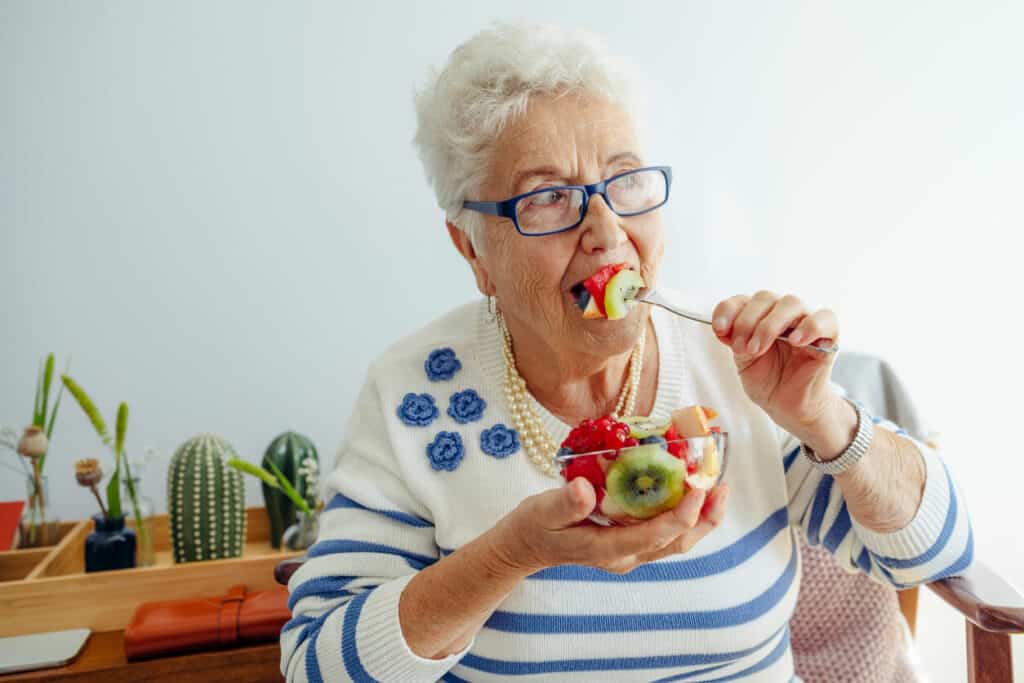
- Genetics. This is a factor upon which dermatology and medicine have little effect as of yet. Some aspects, such as the tone and thickness of the skin are genetically predetermined.
- Medical conditions. Some diseases can have a very detrimental effect on the appearance of the skin. Diabetes, liver disease, obesity, allergies, and cardiovascular disease, to name a few.
What To Look For In Skincare For The Elderly
As a result of all age-related changes, seniors’ skin is typically more fragile, dryer, prone to injuries and irritation, and slower to heal. To prevent skin damage and reduce these effects of aging, it is important to include adequate skincare in daily routines and look for products that address these issues.
If you’re unsure about the best products, you can always look up online resources including Facebook groups dedicated to skincare for elderly people, or seek professional guidance from a dermatologist.
To Relieve Dryness
- Use gentle, pH-neutral, sulfate-free, and fragrance-free bathing products. Bathing soaps and shower gels that are good for babies are also great for seniors. These products are generally created with extra care and are allergen free and less likely to cause irritation to sensitive skin. And if your beloved elderly needs help during bathing time, rest assured that you can find this kind of assistance at Amy’s Eden.
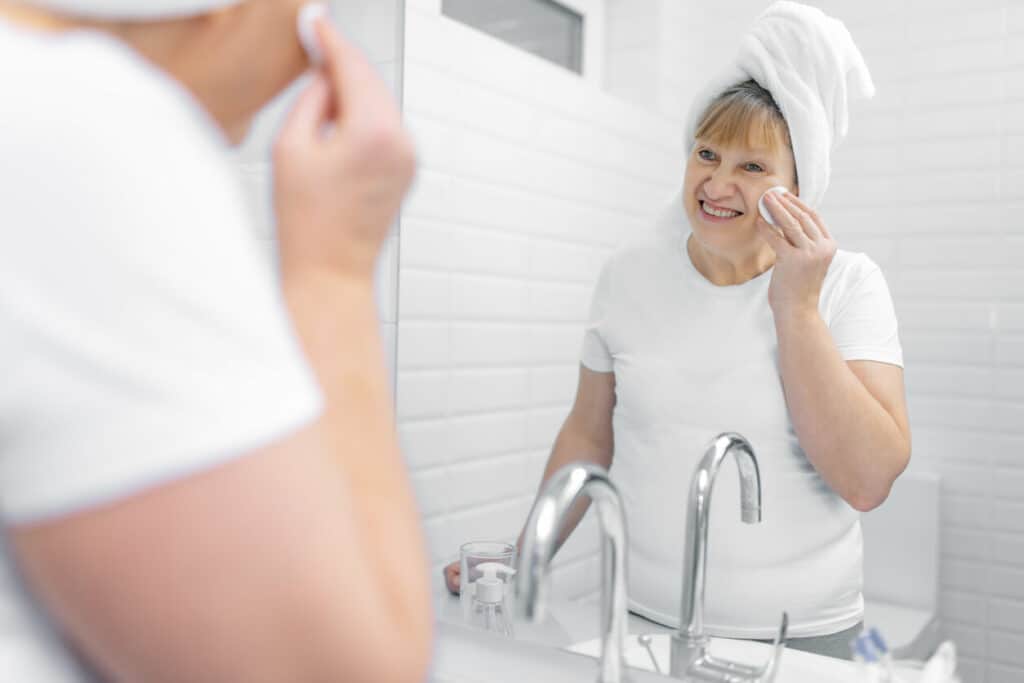
- Focus on moisturizing and hydrating the skin of the body and the face. After a bath or shower, elderly skin needs a moisturizer such as lotions, oils, creams rich in vitamin E, hyaluronic acid, glycerin, and natural oils such as macadamia, argan, coconut, etc. These additives will help capture and seal the moisture in the epidermis of the skin.
For An Anti-Aging Effect
- Look for products that contain ceramides and peptides. These two ingredients are hailed as stimulating collagen production and thus helping the skin look smoother, younger, and plumper.
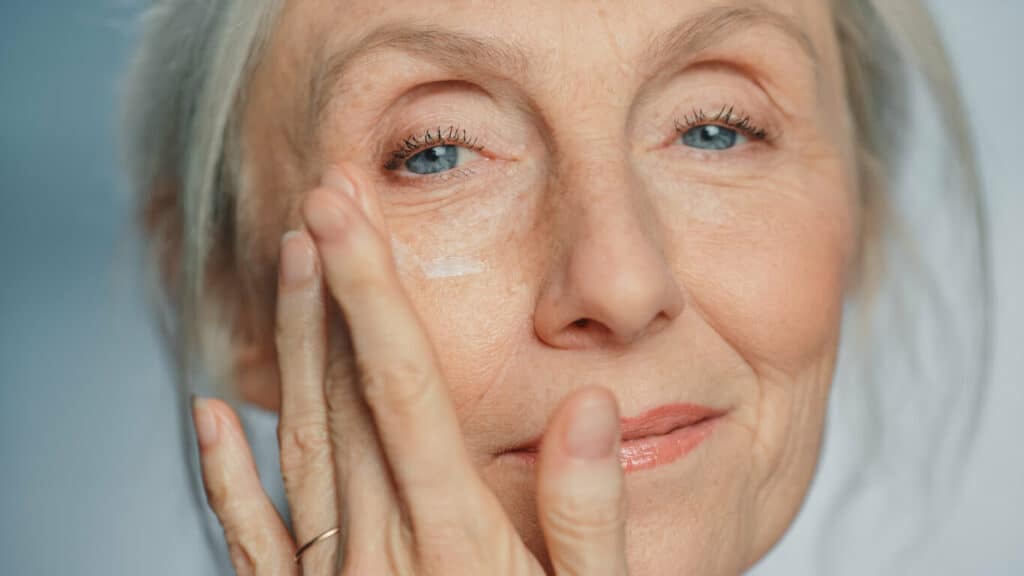
- Use Vitamin A, the magic wand of the anti-aging industry. Usually added to creams in the form of retinol or retinal, this microelement is claimed to stimulate collagen production, fight the thinning of the skin, clear blemishes, and even out the skin tone.
Sunlight Protection
- Sun and heat are already risk factors for the elderly, as they are more sensitive to high temperatures. Therefore it is better to avoid direct sunlight, especially during the times of the day when the sun is strongest – between 10 am and 2 pm.
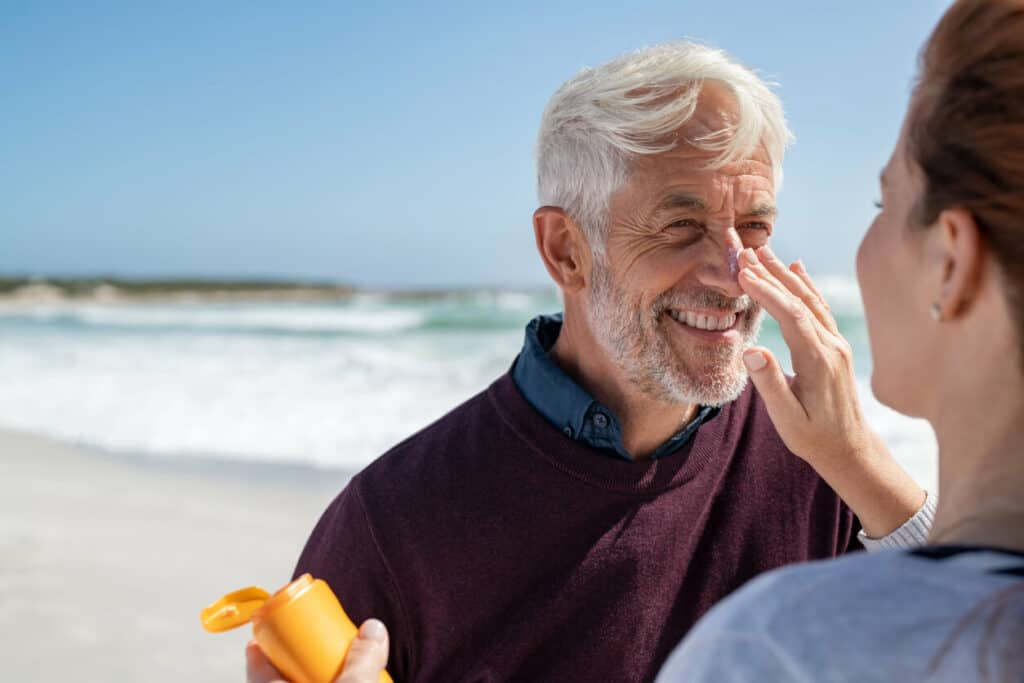
- The rest of the time, make sure to wear protective clothing and accessories that protect the skin from hot and dry air – hats, sunglasses, and long-sleeved shirts made of light, breathable fabric.
- Choose sunscreens that provide maximum protection for the skin’s barrier, SPF 50+, and if your beloved senior spends long hours outdoors, reapply the lotion every 3-4 hours.
To treat bruises
- Some of the best products for bruises contain a high percentage of extract from arnica, known for its anti-inflammatory properties. Arnica can also help alleviate arthritis pain.
- Creams with vitamin K help the body to break down and reabsorb the pooled blood at the site of the bruise.
- Another commonly used anti-inflammatory agent is the extract from the aloe vera plant. Once absorbed into the skin aloe vera can help the blood vessels repair themselves.
- Pineapples contain the enzyme bromelain, which is commonly available as a supplement in capsule form. It helps flush fluids out of the tissues and thus decreases swelling and speeds up the recovery time of any kind of skin injury.
Before applying any new products or treatments to your loved one’s skin, be sure to review the content and check for any potential side effects.
Summary
Elderly skin has unique needs that are quite different and require the use of age-specific skin care products and treatments. To increase the quality of life during your beloved golden years you should be aware that their skin is more fragile. It needs extra hydration and as much protection from dangerous sun rays as possible.
Today, most skincare brands have developed lines dedicated to mature or aging skin. Products from these lines typically have a rich texture and ingredients geared towards boosting hydration, clearing the tone, and improving the plumpness of the skin. Additionally, it is a good idea to provide your loved one with an anti-bruising ointment or cream and some non-aggressive cleaning or wash products.
At Amy’s Eden, our caregivers understand the challenges that come with aging and skin health. We rigorously follow the skincare routine already designed for your aging loved one, or recommend one, so your loved one can continue to look their best as they live out their golden years.
References
https://medlineplus.gov/ency/article/004014.htm
https://www.healthline.com/health/senile-purpura
https://blissoma.com/skin-hormones-hormonal-skin-aging-elasticity-estrogen
https://www.aad.org/public/everyday-care/skin-care-basics/care/skin-care-in-your-60s-and-70s

